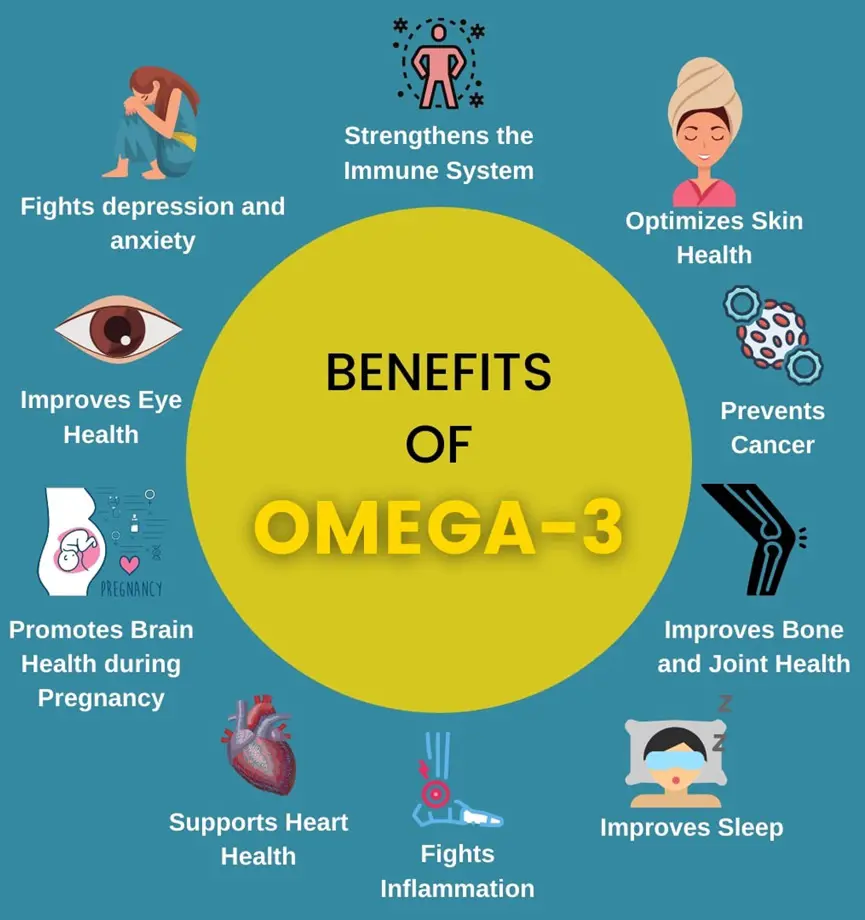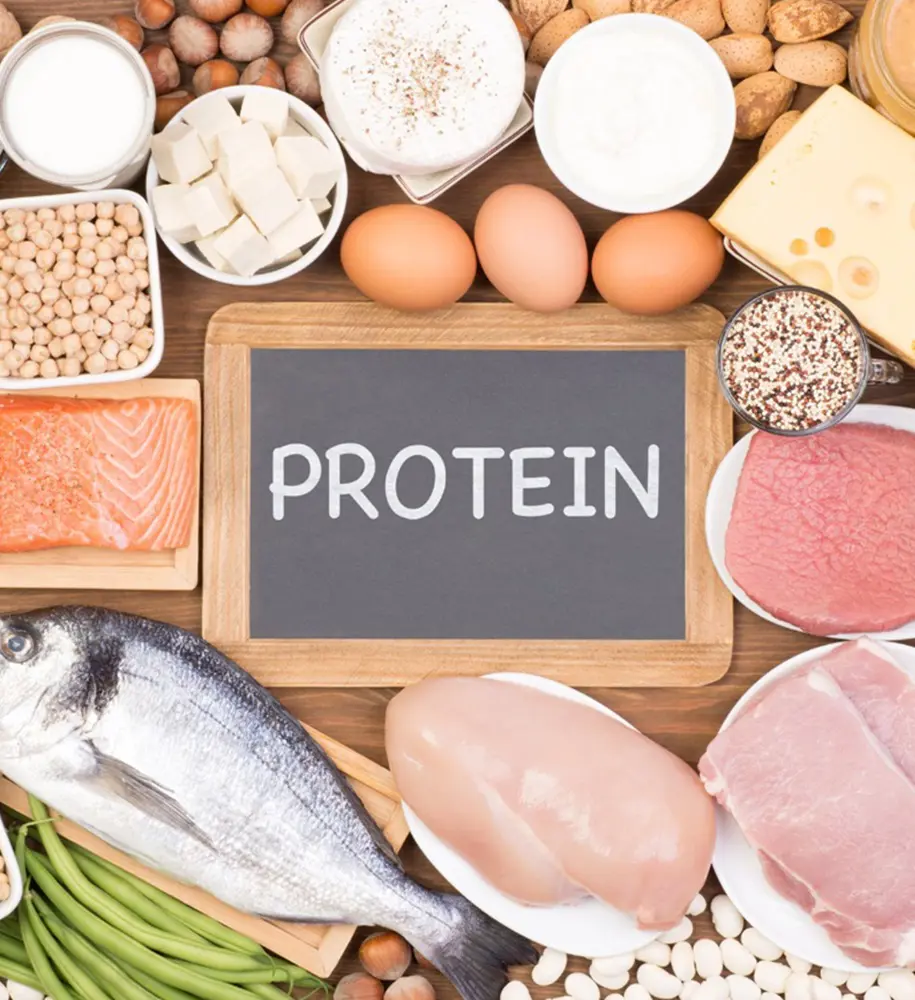How Much Omega-3 Per Day Is The Right Amount?

This post may contain affiliate links. If you make a purchase through links on our site, we may earn a commission.
Omega-3 fatty acids are advantageous for so many aspects of health-from heart, brain to joints. So, "How much to add" can be a general query of many.
To help you get through this, and to let you know the appropriate amounts needed depending on the age, gender and other factors, we have brought this comprehensive guide. Here, we have put everything together to help you find out how much omega-3 is ideal for you.
An Overview of Omega-3 Fatty Acids
Omega-fatty acids fall under the category of healthy unsaturated fatty acids called polyunsaturated fatty acids. Abundantly found in fishes high in fat, these fats can not be produced by the body, making it an essential nutrient that needs to be supplied through diet.
Omega-3 fatty acids are further divided, the main ones include 3 types, namely alpha-linolenic acid (ALA), eicosapentaenoic acid (EPA) and docosahexaenoic acid (DHA). Among them, EPA and DHA is obtained primarily from animal sources (fish) and ALA is obtained from plant sources.
The General Recommendation

The RDA value of omega-3 fatty acids varies by the type. Must studies recommend the use of 250 to 500 milligrams of EPA and DHA combined per day. The American Heart Association however recommends eating at least two servings of fish a week. Including any fish from anchovies, herring, mackerel, salmon, sardines, bluefin tuna, oysters and mussels is suggested.
The USDA on the other hand also has its own guideline, it recommends consumers not exceed 5g/day, combined ALA and DHA, from the diet.
If you follow a plant-based diet and can not consume fish, then you may go for plant-based options to get ALAs. In this case, 1.1g to 1.6g of total ALA is considered an appropriate amount.
Omega-3 Depending On Different Factors
The optimal omega-3 you require can vary depending on different factors. The important ones to consider are:
For Men
Men tend to need more omega-3s because of their large body size. About 1.6 grams of omega-3s daily is said to suit the body demand in males.
For Women
Women can have regulated hormone production due to the consumption of omega-3. This is considered even more helpful during menopause, as it can help overcome mood swings, hot flashes, and changes in cholesterol levels. About 1.1 grams of omega-3s is appropriate for adolescent women, and for the ones going through menopause, consulting with a doctor and setting the limit can help.
For Pregnant

For pregnancy, around 650mg of dietary goal is recommended, with 300 being DHA. For a plant-based diet, algae-derived DHA works well equally. DHA is so necessary as it helps in the development of the brain and other sensitive organs in the fetus.
For Kids
Kids comparatively require a lesser amount of omega-3. Starting from birth, around 0.5 grams is sufficient for babies up to 12 months which needs to be consistently increased as they age.
- For 9-13 years of kids, 1 to 1.2 grams omega-3 is recommended.
- For 14 to 18 years of teenagers, 1.1 to 1.6 grams of omega-3 is recommended.
Health Status
For a heart patient, omega-3 can help a lot. Doctors often recommend a higher omega-3 intake, particularly in the form of supplements for such individuals.
Special Considerations
For people who are on anticoagulants or nonsteroidal anti-inflammatory drugs (NSAIDs), omega-3 fatty acids may require careful consideration. This is because omega-3s have natural blood thinning properties and the inflammation-inducing effect of NSAIDS can also get easily hindered by these natural anti-inflammatory agents.
These people should rely on relatively few omega-3-based diets. For a precise amount, consultation with medical personnel is necessary.
Omega-3 Sources

The best sources of omega-3 fatty acids are fatty fish. EPA and DHA are present in animal sources. Salmon, anchovies, sardines and herrings are some foods packed with omega-3s.
If you are not a fish fan then you can also opt for plant-based omega-3s options. These sources provide a different form of omega-3 than the fishes. ALA, or alpha-linolenic acid is the compound present in these plant sources. The ones that contain ALA abundantly include oils of flaxseed, canola, walnut and soybean.
Microalgae is also a plant-based option that can help you meet the needed amount of omega-3s. If available, you can also use algal oil in your diet. The unique aspect of this plant-based source is that it has EPA and DHA but not the ALA form of omega-3.
Omega-3 Supplements
When the recommended value of omega-3s can not be met by diet alone, omega-3 supplements are generally used. The supplements are generally made from fish oil and are healthier when compared to whole fish as the toxic elements present in fish like mercury are removed during the manufacturing.
These supplements are also generally recommended by doctors for special conditions like high triglycerides and pregnancy. Plant-based alternatives to these supplements are also available.
Benefits of Omega-3 Fatty Acids

There are multiple benefits of omega-3 fatty acids and each of them is strongly backed by science. The power omega-3 holds in supporting different parts of our body are listed below:
Heart Health
Omega-3 is good for heart health. It is known to reduce any type of fat deposition in the blood vessels, preventing any diseases that come with it. As the blood flows smoothly, there is little for any heart complications to occur.
Omega-3 is also known to reduce blood pressure. This also helps to reduce strain on the heart. Moreover, the American Heart Association also recommends to use of fish and fish oil in order to reduce diseases related to the cardiovascular system.
Brain Health
Surprisingly, DHA makes up about 30% of the brain's fat in the cerebral cortex region. So, consuming enough omega-3 can help improve memory, thinking and processing power. Upon regular intake, these fatty acids can also help reduce the chances of cognitive decline that occurs with age.
Not only do omega-3s help boost the processing power, rather, studies indicate that people suffering from mental conditions like anxiety and depression can also benefit from them. People having repetitive incidences of these problems are also recommended with omega-3 supplements.
Reduces Inflammation
Omega-3s can reduce the compounds in the body that are linked with increased inflammation. So, they can be extremely beneficial for people suffering from conditions like arthritis.
Also, for healthy people, meeting omega-3 requirements can help reduce the occurrences of chronic diseases that are often linked to consistent inflammation.
Boosts Immunity
Whenever the body needs a strong immune response, the availability of omega-3s can help the body achieve it. These beneficial compounds do so by modulating the production of signaling molecules called eicosanoids that influence how efficiently the immune system reacts.
Good For Eyes

DHA makes the key structural part of the retina of the eye. So, consuming enough helps to preserve this structure preventing any kind of loss of vision that comes with a defect in processing light and sending visual signals to the brain.
The adequate intake of omega-3s is also associated with the prevention of age-related macular degeneration (AMD).
Good For Skin and Hair
Omega-3s are known to regulate the production of enough amount of skin oil. By doing this, they help to prevent any kind of dryness and flakiness.
Also, these fatty acids keep the hair nourished and reduce hair loss by improving the circulation around the follicles. Overall, hair tends to be shiny and is less prone to breakage.
For Pregnant Women
DHA is essential for the development of the fetus. Be it brain development or the development of organs like the eyes, taking a sufficient amount of omega-3 is important as it makes an important percentage of our core organs.
Mothers who consume the recommended amount of omega-3s during their pregnancy are known to have babies with improved memory power and also don't have to go through complications like preterm birth.
Weight Management
Omega-3 consumption is linked with a decrease in the accumulation of body fats, especially in the belly region. Also, this compound increases the sensitivity of the hormone insulin, making sure the sugars you consume are completely metabolized, preventing any risks of unhealthy fat storage in the body.
Effects of Under and Over Consuming

Both overconsumption and underconsumption of omega-3s can lead to unwanted side effects, affecting everything from your heart to your immune system. Let’s take a closer look at the effects of both over and under consuming omega-3s:
Under Consuming Omega-3
Though there may not be immediate changes in not getting enough omega-3s, over time, it can slowly chip away at your health. Some common ones include:
Increased Joint Pain and Inflammation: Joint pain can dominantly show in individuals not consuming enough omega-3. Omega-3 is a natural anti-inflammatory agent and it can help in the lubrication of joints, helping to reduce joint pains as well as overall body inflammation.
Cognitive Decline: The cognitive power you had at a younger age may not remain the same and may degrade even more in the omega-3 deficient condition. For easy concentration, clear thinking or remembering things easily, it's important to get the right amounts of omega-3s.
Heart Health Risk: As omega-3 has the ability to prevent the buildup of plaques in the arteries, consuming it in fewer amounts gets you on the other side. A diet that does not meet the RDA value of omega-3s, in the long term, can increase the chances of heart disease.
Also, in the absence of omega-3s, the healthy balance of LDLs and HDLs is easily lost. This increases the chances of heart disease even more.
Struggles with Mental Health: The absence of DHA in the diet and anti-inflammatory effects of omega-3 fatty acids can show negative effects on the brain. As a result, the chances of depression, anxiety and other mental issues can rise significantly. As DHA makes up a significant portion of the brain cortex, a deficiency in omega-3s also means increased chances of cognitive decline and neurological disorders.
Over Consuming Omega-3

Consuming too much of a good thing won't do good either. Taking excessive amounts of omega-3 has unintended consequences including:
Vomiting
Too much omega-3, including fish oil, can irritate the stomach. This is commonly observed when you take these supplements on an empty stomach. These fish oils are more effectively absorbed when taken with food, on consuming it solely, there is a high chance that the stomach linings will get irritated leading to symptoms like vomiting and indigestion.
Constipation
Though, in general, omega 3s are supposed to support gut health, consuming too much creates digestive issues. Too much of these fats can overwhelm the digestive system making it harder to digest fats. Excess omega-3s can also decrease the gut motility. Overall, with all effects combined, you may have to face constipation.
Blood Thinning
Omega-3s affect the blood clotting mechanism in the body, it prevents the formation of clots. So, this blood thinning property may create havoc if you consume omega 3s in a large amount. The effects may show up as a longer wound healing time. This can be concerning if you are injured or undergoing surgery.
Skin Reactions
Rashes, hives are itches are commonly seen in people consuming too much of omega-3s. This is mainly seen against fish-derived oils. The imbalance of fatty acids in the body may also result in conditions like acne flare-ups and breakouts.
Some Tips:
- For anyone who is new to omega-3 supplements, it is always better to start with a low dose. As your body adjusts with time, you can substantially increase the dose.
- Also, if you have a target of a certain dose, try to split it into smaller doses throughout the day. This can reduce the burden your digestive system has to bear.
- If fish oil seems to be persistently problematic, you can opt for plant-based omega-3s including algal oil. Being from a plant, they are less irritating to stomach lining.
Balance Of Omega-3 and Omega-6
Omega-3 and omega-6 are polyunsaturated fatty acids and both are essential ones. So, while consuming them, it's important to balance the ratio. It is recommended to maintain the ratio of omega-6 to omega-3 in the ratio anywhere between 2:1 and 4:1.
This balance is important as omega-6s also have important functions to carry. Omega-6 maintains the integrity of skin cells, helps the body in proper immune response and is also beneficial for the skin, eyes, brain and heart. In cases where the balance is not maintained and tips too far toward omega-6, it can lead to unnecessary inflammation. As a result, people may have to suffer from conditions like heart disease and arthritis.
On the flip side, too much omega-3, which has anti-inflammatory properties and normally helps to counteract the effects of omega-6 can weaken the immune system. This in turn halts the body's ability to fight infections and other diseases. So, for a healthy body, balance is the key.
Factors Affecting Omega-3 Content In Diet
Many factors influence the omega-3 content in food, from storage to cooking methods. Here’s an overview of how the original omega-3 content in raw foods may degrade before consumption:
-
Farmed fish tend to have higher amounts of EPA and DHA compared to the wild ones.
-
The amount of omega-3, all EPA, DHA and ALA, can get destructed while cooking. This is because of the heat sensitivity of these fatty acids. So, if you are thinking of adding fish to your diet to increase your omega-3 intake, then it's better to avoid any preparation method that uses high heat including frying and grilling. Rather, opt for cooking methods like baking and steaming.
-
Some people may also use oils, like flax seed oil as a source of omega-3 fatty acids. If you are one of them then you should know that they are prone to oxidation (from light and heat). So, it's best to store them in a cool and dark place for long-term use.
Recent posts
Lifestyle
Lifestyle
How Much Protein Should You Consume In a Day?
Protein is one of the macronutrients that are essential in the human body for tissue building, repair, immunity and hormonal balance. The Recommended Daily Allowance or RDA covers a daily protein allowance of 0.8 grams per kilogram of body weight wh...
Lifestyle
How To Fillet A Fish?
Nothing beats the deep happiness of filleting your own fish, but only if you have done it before. While beginners might find it challenging at first, the process becomes easier with the right guidance. Whether you are filleting with a fresh catch or ...
Lifestyle
How Much Fiber Do You Need On Your Diet?
Fibers are what keep our digestive system healthy. Many of us have heard the buzz about how fibers are important and how they keep "things moving", making these nutrients our gut friends. If after knowing all the basics, the amount of fiber to be add...
Lifestyle
Is Apple Cider Vinegar Good For Weight Loss? How To Use
Shedding those extra pounds is a tough task for all. And for individuals in this journey, looking for trends that have gained significant traction is not a new thing. One such trend that has caught the attention of many is the use of apple cider vine...
Lifestyle
How to Digest Food Faster? 11 Natural Ways To Improve
As we have stepped into the world of a more sedentary lifestyle, all of us are more prone to physiological disorders. One of the consequences of not getting exposed to proper exercise is a delay in the digestion rate. For people who are on desk jobs,...
Lifestyle
How To Get Vitamin D From Sun?
Vitamin D is an essential vitamin, meaning, if you don't get it from external sources there's a high chance you will have a vitamin D deficiency. Sun is one of the natural sources of vitamin D, but wait a bit, don't get confused, merely spending time...





